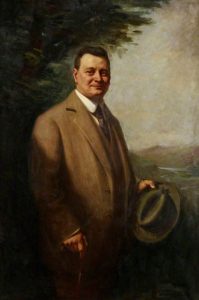Let’s Not Forget William Graham Moffat, Who Died in December 1951

Cowan Dobson, Graham Moffat (1866-1951), Actor and Playwright; Reproduced Courtesy of the National Galleries of Scotland.
An obituary on page three of The Glasgow Herald, on Friday the 14th of December, 1951, reads:
“SCOTS ACTOR AND PLAYWRIGHT
The death is announced of Mr Graham Moffat, the Scottish actor and playwright, who found his
chief success in ‘Bunty Pulls the Strings,’ a play which was produced in 1911 and sent his fame
over the English-speaking world. Mr Moffat, who retired to South Africa in 1936, died suddenly
on Wednesday at his home, Camps Bay, Cape Province.
Born in Glasgow in 1866, Graham Moffat was the son of a notable elocutionist, whose family of
four sons and one daughter all distinguished themselves on the stage. Graham was educated at
Rosemount Academy, Glasgow, and on leaving school found employment in an office. As a young
lad he took up elocution and photography as hobbies, and his progress in both resulted in his
adopting them as professions. During the winter months he gave recitals with his sister Kate; in
the summer season he was a landscape photographer with Valentine and Sons, Dundee.
‘BUNTY’ TAKES THE STAGE
Next he tried his hand in 1907 at writing plays as a hobby. Three years later he became a
professional playwright, and in 1911 he produced ‘Bunty Pulls the Strings’ at the Playhouse,
London. Later the work so deeply impressed Cyril Maude that he put it on at the Haymarket
Theatre, where it ran for over 600 performances. It became immensely popular. Fashionable
London took it up. ‘Bunty’ had conquered the West End. Mr Asquith was among the classical
scholars who found in this quaintly amusing study of Scottish character a source of enjoyment
which could not be wholly satisfied with one performance. It recalled the earlier triumphs of
Barrie and the’Kailyard’ school.
Graham Moffat attributed no small part of the play’s remarkable success to the fact that the
cast was practically a family affair, for six of them took part in it – the author, his wife (who
also designed the dresses), their daughter, two brothers, and a sister. ‘Bunty,’ the author
once declared, was not his best play, though it was certainly the most the most successful. At
home and abroad he found keen interest aroused by performances of his other works, such as
‘A Scrape o’ the Pen,’ ‘The Concealed Bed,’ ‘Till the Bells Ring,’ and ‘Susie Tangles the Strings.’
STUDIES IN SCOTTISH CHARACTER
In all his work he tried to amuse the public without appealing to what was base or ignoble in
human nature. He said so on one occasion, and it can be acknowledged without hesitation
that he succeeded in his ideal. His mind was steeped in Scottish character, the simple ways, the
pawkiness and the pathos of the life of the common people. In his case the characters suggested
the story, not the other way round, as often happens. He believed there was a bright future for
Scottish drama, and although he chose to dwell mainly upon the lighter side, he drew characters
which every Scotsman can recognise as true to life. As actor and playwright Graham Moffat won
a distinctive place in the history of the theatre.
Mrs Graham Moffat, who was Maggie Liddle Linck, and was born just south of the Border, was
brought up in Glasgow. She died in 1943. The daughter Winifred survives.”
The notice of William Graham Moffat’s death is on front page of the Herald.
George Fairfull-Smith, April 2022.
